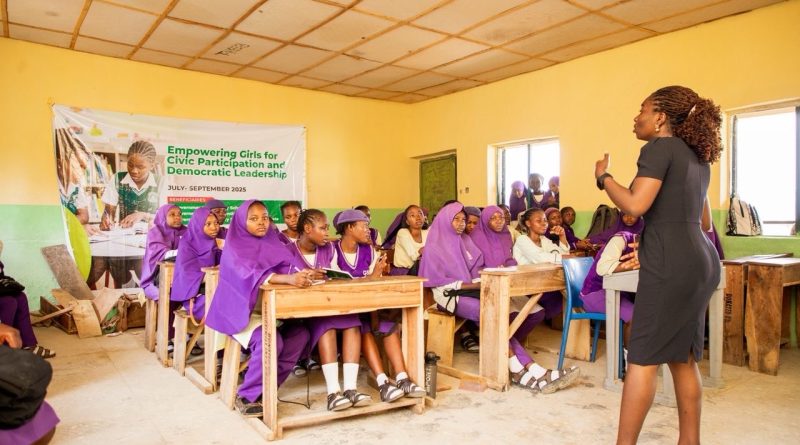INTERVIEW: Teaching girls to lead is the first step to women’s political inclusion
Until now, Nigerian women have consistently advocated for greater representation in leadership and decision-making. Despite their vital contributions to society, women remain largely underrepresented in politics.
In this interview with PREMIUM TIMES, Phoebe Ojo-Nemile, a lawyer and advocate for girls’ leadership and civic participation, speaks on why it is crucial to educate young girls about leadership and confidence, and how her initiative, LeadHers.NG is helping to bridge that gap.
PT: Could you please introduce yourself and share a little about your background?
Ms Ojo-Nemile: My name is Phoebe Ojo-Nemile, and I am a lawyer from Kogi State. I was born and partly raised in Kogi and Abuja. For over four years, I have been involved in advocacy around access to justice, civic participation, and women’s rights. My journey to becoming a lawyer deepened my passion to empower young people, especially girls, to believe in their voices and their ability to lead.
PT: You mentioned that girls are rarely encouraged to see themselves as leaders. Can you share a personal experience that made you notice this gap?
Ms Ojo-Nemile: I grew up in a typical African home where a girl’s behaviour was constantly measured against marriage. Phrases like “You are a girl o!” or “Is that how you will behave in your husband’s house?” were common.
These messages taught girls to shrink themselves, while boys were told to take charge. As I grew older, I realised that this early conditioning affects confidence and limits women’s leadership aspirations.
PT: What inspired you to start your leadership initiative?
Ms Ojo-Nemile: There were three defining moments. The first came after school when I began stepping into leadership spaces and realised how unprepared I felt.
The second was during my time at the HBS Green Academy in 2023, where a male speaker noted that women often doubt themselves even when they are just as capable as men.
The third was when I was applying for a US fellowship and was asked how I had personally tried to solve the problems I cared about. That question made me realise I needed to start creating the change I want to see.
PT: From your interactions, what challenges do girls in Abuja schools face regarding leadership and self-confidence?
Ms Ojo-Nemile: The biggest challenges they mentioned were a lack of confidence and the absence of role models. At Government Girls Secondary School (GGSS) Dutse, one girl said she struggled to see herself as a leader because no one had ever encouraged her. That moment stayed with me.

PT: Tell us about the leadership toolkit you developed.
Ms Ojo-Nemile: The toolkit introduces leadership in a simple and relatable way. It explains what leadership means, how to lead effectively, and how to handle challenges.
It also covers democracy, women’s representation, and ways girls can prepare to change the narrative. We used stories and teen-friendly examples so they could easily see themselves in them.
PT: What experience from your training stands out the most?
Ms Ojo-Nemile: After a session at Government Secondary School (GSS) Kubwa, one student said parts of the training brought tears to her eyes because they spoke directly to her fears and hopes.

At GGSS Dutse, the student president said the training gave her confidence to lead better. Those moments remind me why this work matters.
PT: What did you learn from the students while running these sessions?
Ms Ojo-Nemile: I realised that their leadership potential is not being nurtured enough. Many had never heard of women like Funmilayo Ransome-Kuti or Hajiya Gambo Sawaba but could list several male leaders.
ALSO READ: Group launches tracker on lawmakers’ stance on women’s bill
This made me see how women’s contributions are often overlooked and how that silence shapes what girls believe is possible for themselves.
PT: Beyond your project, what roles can schools, parents, and policymakers play?
Ms Ojo-Nemile: Schools should ensure leadership roles are gender-balanced. Parents should tell their daughters, just as they tell their sons, “You can lead.” When a girl hears her mother say that something shifts inside her. Policymakers, especially women, must also push for systems that create more opportunities for girls to rise.
PT: Some argue that leadership training alone cannot address structural barriers. How do you see your work fitting into that conversation?
Ms Ojo-Nemile: That is true; training alone will not dismantle barriers. But it lights the fire. Women like Funmilayo Ransome-Kuti and Gambo Sawaba faced immense challenges, yet their courage carried them through.
We are nurturing that same courage and confidence in these girls. Change starts with a mindset.
PT: What has been your biggest challenge in leading this initiative?
Ms Ojo-Nemile: Funding was a major hurdle. I initially planned to fund the first training at GSS Kubwa from my pocket, but support from Heinrich Böll Stiftung Abuja allowed me to expand to three schools.
I also battled imposter syndrome, wondering if I was “enough” to lead such an initiative. But I remind myself that impact is not about size or perfection but about starting where I am.
PT: How do you plan to sustain and expand the project?
Ms Ojo-Nemile: We have set up leadership clubs in the schools to keep the momentum alive. Subsequently, I hope to host conferences and other events where girls can learn directly from women leaders across different sectors and build their leadership capacity. We have also launched GirlsLead.NG on TikTok and Instagram to share teen-friendly leadership content, so the lessons don’t end at the training. I envision it growing into a safe, empowering space where girls can learn, unlearn, and lead confidently.


